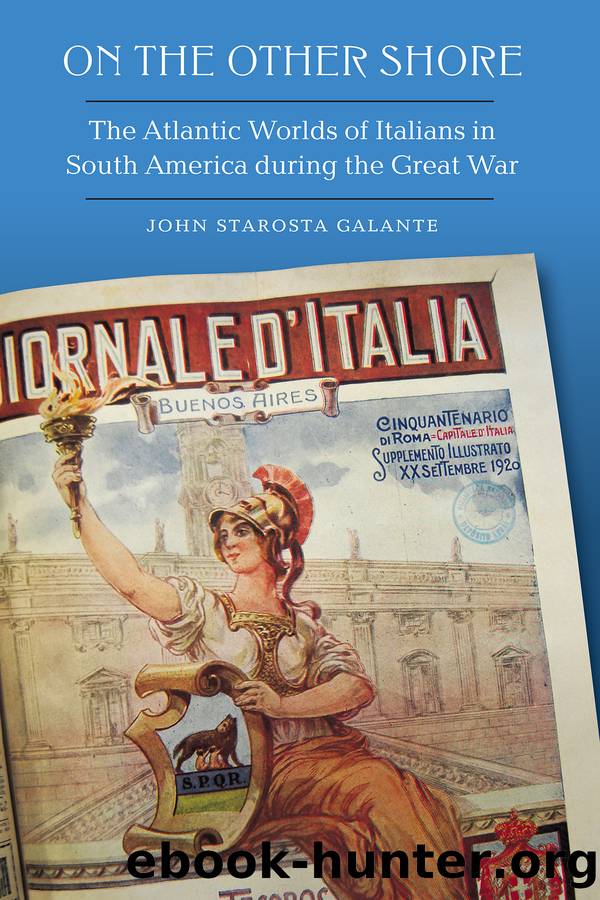On the Other Shore by John Starosta Galante;

Author:John Starosta Galante; [Galante, John Starosta]
Language: eng
Format: epub
Tags: HIS027090 History / Military / World War I, HIS020000 History / Europe / Italy, HIS033000 History / Latin America / South America
Publisher: University of Nebraska Press
Fig. 25. Opposition to the pro-war mobilization in São Paulo. âLa cuccagna patriottica di lor signoriâ (The patriotic bonanza of their lords), Avantì! (São Paulo), March 10, 1917.
After the 1915 recruitment drive, Italians and others opposed to the war targeted additional activities of the pro-war mobilization, including the editorials, rallies, speeches, goods collections, and loan programs described in previous chapters. A headline in Guerra Sociale summarized this effort: âNon date niente!â (Do not give anything).63 Underlying these antiwar efforts was a deep-seated abhorrence for the self-appointed leaders of the pro-war camp. Working-class periodicals in Buenos Aires, Montevideo, and São Paulo used vicious critiques, irony, ridicule, and protest to expose what they believed to be the true motivations for the pro-war effort: social status and financial gain. Long-standing class-based grievances played out within Italian overseas communities through disputes about the war.
São Pauloâs Avanti! was at the forefront of the struggle to undermine pro-war activities of the middle- and upper-class immigrants it referred to sarcastically as âlor signori,â or âtheir lords.â Even when Avanti!âs columnists occasionally voiced support for working-class troops at the front, they never wavered in the depiction of lor signori as the true enemies of São Pauloâs Italian working classes.64 Foremost among Avanti!âs opponents was Umberto Serpieri, the editor and lead columnist at Fanfulla. Avanti! called Serpieri âamoralâ and referred to a speech he gave at an Italian nationalist social event as âa very low and foul instigation of racial hatred.â65 The newspaper also slammed Serpieriâs biography of Gaetano Pepe for including details of Pepeâs fabricated and âcomicalâ military accomplishments, which Serpieri thought would encourage others to enlist.66
Avanti! charged that other self-appointed leaders of Italian communities âcover their profiteering with the drape of the Italian flagâ and, despite their public rhetoric, harbored draft dodgers within their businesses and families.67 The most scathing critiques of the pro-war leadership came when Avanti! alleged that businessmen like Ermelino Matarazzo, Rodolfo Crespi, and Nicola Puglisi-Carbone (referred to in chapter 3) participated in a âbeautiful robberyâ through their war support.68 It accused these âusurersâ of benefiting from scarcity associated with the conflict by increasing the prices of goods they sold in Brazil and to export markets: âWe are against these false patriots and we are against them as Socialists and as Italians.â69 The latter label was a critical indicator of the shape and drivers of the antiwar movement in São Paulo and elsewhere.
Download
This site does not store any files on its server. We only index and link to content provided by other sites. Please contact the content providers to delete copyright contents if any and email us, we'll remove relevant links or contents immediately.
| Argentina | Bolivia |
| Brazil | Chile |
| Colombia | Ecuador |
| Guyana | Paraguay |
| Peru | Suriname |
| Uruguay | Venezuela |
Cat's cradle by Kurt Vonnegut(14729)
Pimp by Iceberg Slim(13759)
Underground: A Human History of the Worlds Beneath Our Feet by Will Hunt(11822)
4 3 2 1: A Novel by Paul Auster(11764)
The Radium Girls by Kate Moore(11594)
Wiseguy by Nicholas Pileggi(5297)
American History Stories, Volume III (Yesterday's Classics) by Pratt Mara L(5129)
Perfect Rhythm by Jae(5061)
The Fire Next Time by James Baldwin(5002)
Paper Towns by Green John(4775)
Pale Blue Dot by Carl Sagan(4600)
A Higher Loyalty: Truth, Lies, and Leadership by James Comey(4537)
The Mayflower and the Pilgrims' New World by Nathaniel Philbrick(4273)
The Doomsday Machine by Daniel Ellsberg(4235)
Killers of the Flower Moon: The Osage Murders and the Birth of the FBI by David Grann(4166)
Too Much and Not the Mood by Durga Chew-Bose(4082)
The Sympathizer by Viet Thanh Nguyen(4075)
The Borden Murders by Sarah Miller(4000)
Sticky Fingers by Joe Hagan(3899)
